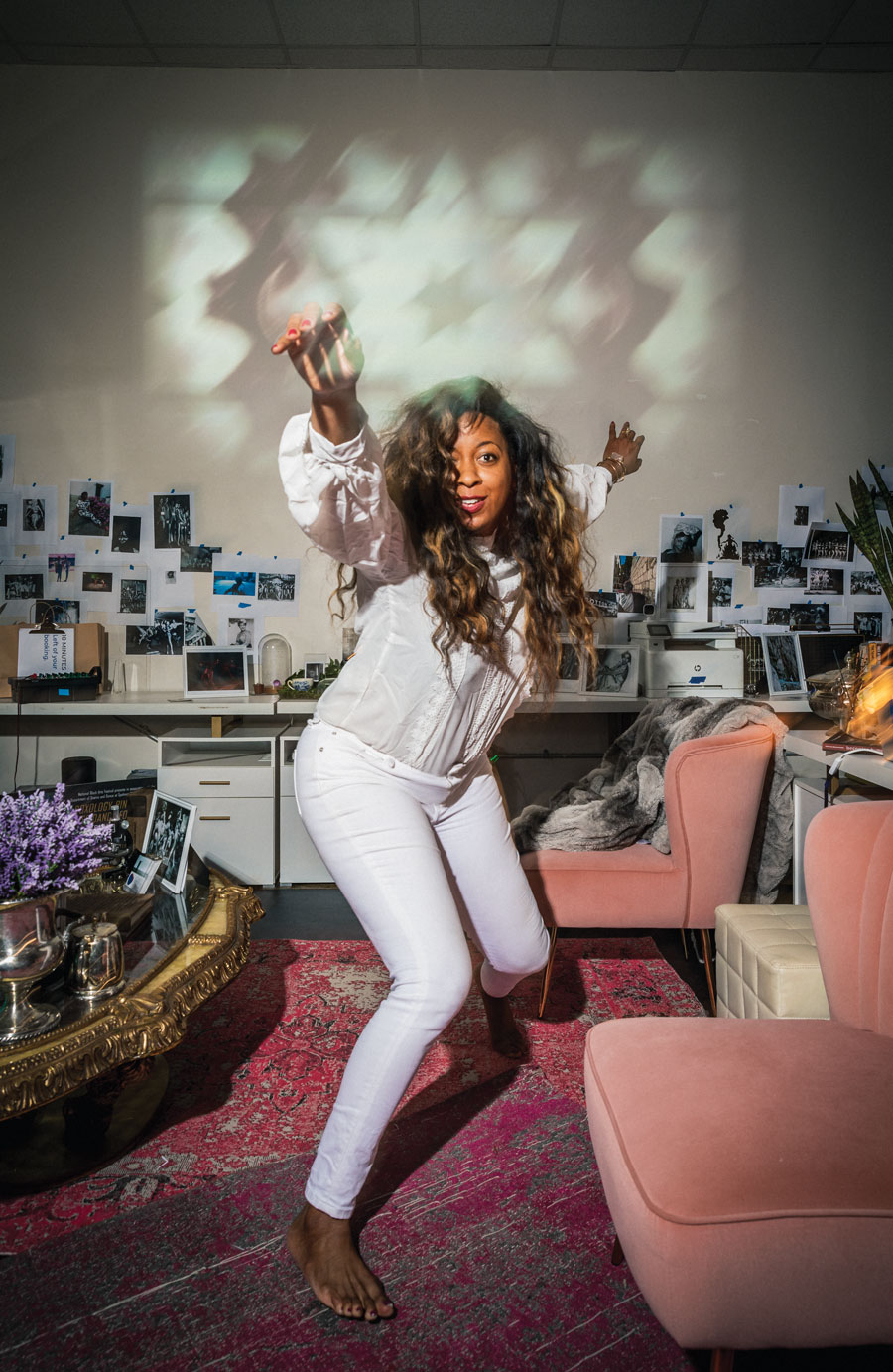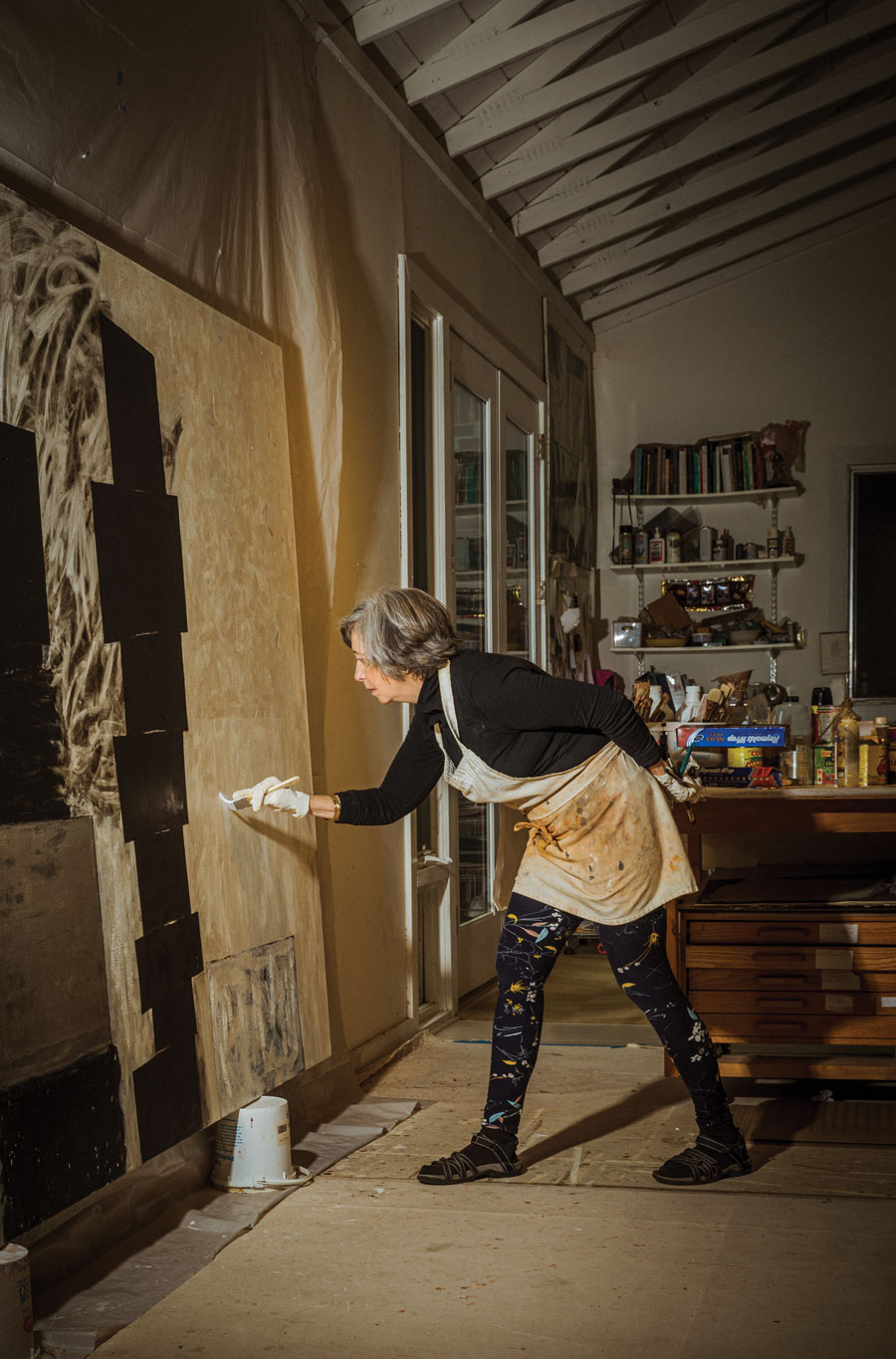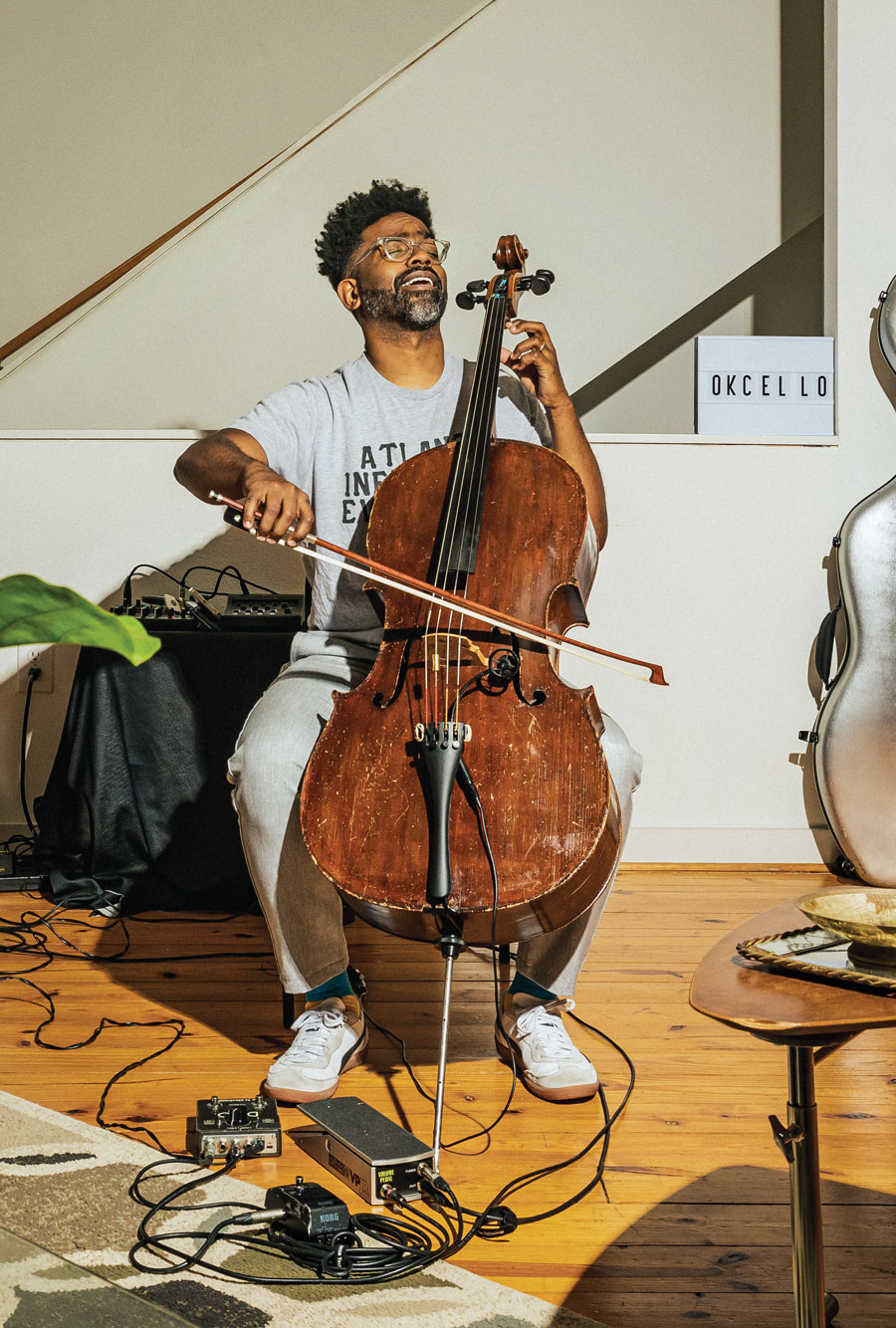60 Voices: Atlanta’s rising creative class is gaining new recognition on the national scene


Photograph by Audra Melton
T. Lang | choreographer, dancer, owner of the Movement Lab incubator; artistic director of T. Lang Dance
Chicago native T. Lang chose to radically change her life with a move to Atlanta 12 years ago after living in New York City. And she’s now firmly enmeshed in a changed South where her family formerly dwelled for decades. “This is my home,” she says. “I own property, I own space, I’m a tenured professor at Spelman.” For Lang, Atlanta is a place of possibility, for both Black and white people, to reclaim and remake the notion of the South for the greater good.
What keeps me here is this notion of returning back to the South and returning back to where my family felt the need to flee for liberation, autonomy, dignity, and that “American dream.” What keeps me here is the fact that, as an artist and choreographer—who thought she was going to live and die in New York—I see a plethora of Blackness here along with all types of cultural backgrounds and socioeconomic difference just in our little bubble of Atlanta, in the South. It still excites me. There’s still this danger and progression and radical feeling I have about living in this city. It feels bigger than the moment is.
I would love to see rural and metropolitan counties coming together to have real conversations about reconciliation and understanding and empathy and new practices and approaches to get to that level of healing—which is messy. It’s not clean and neat, but [it’s] necessary work.
Sarah Kennel | photography curator, High Museum
Though she’s only been in Atlanta for a year and a half after taking her position as the High Museum of Art’s Donald and Marilyn Keough Family Curator of Photography, Los Angeles native Kennel and her young family have found plenty of inspiration and creative nourishment in their neighborhood of Oakhurst in Decatur. Southern quirk abounds: Goats trim area lawns and one of her neighbors has created a vibrant, built environment reminiscent of the High’s folk and self-taught art collection. Her time in Atlanta has already changed how she views her work growing the High’s photography collection.
It feels like a young city. The energy of all the students—and the fact that it is an incredibly diverse city and majority African American—also makes it really interesting for what I do in photography at this moment. Especially in photography, so much interesting work is being done by artists of color or artists who are exploring the history and legacy of the United States.
Atlanta is such an interesting place to be at this moment. The historic shift in politics that we witnessed here really suggests that this is a place where a lot of different people are trying to find a way to live together, which could be a model for this country. As much as we loved living in Marblehead, Massachusetts, that was a small, old, established, majority-white, New England seaside town and its identity is so rooted in the past. Atlanta feels very different.
I think that it’s partly the city, and it’s partly the people I’ve met, but I definitely think I’ve grown more and more interested in and engaged with artists working in this region, in Atlanta, or more broadly in the South. That’s partly because it’s one of the missions of our photography collection—we are strongest in Southern work. But also because I think there’s a lot of interesting art being done here. And I think my focus is more on emerging and midcareer artists than I had anticipated. I had previously thought about historic collections, but I think what I see happening within this field and what I think might be very exciting for the various artists we serve at the High are a mix that brings in more of the younger, emerging artists.
Atlanta is really centered around creative Black culture. Black creativity is celebrated in Atlanta in a way that is not the same as in Los Angeles, and that’s exciting and interesting and really important. And I think it makes the city distinctive and a leader in many ways.
Layla Felder | collector, artist, and advocate
A junior at the Atlanta International School, Felder discovered a love of opera at age two via Sesame Street and, in the second grade, started a club, Kids Opera & Art Posse, which still encourages younger audiences to engage with the arts. An actress herself, she’s appeared in locally made short films, has a recurring role on the Golden Globe–nominated TV series The Sinner, and has interned at the Metropolitan Opera and with Atlanta artist Fabian Williams. She also has a pretty serious art collection with works by Wini McQueen, Grace Kisa, and Fahamu Pecou.
For a long time, people have viewed opera houses, concert halls, and museums as very elitist places where, if you’re not of a certain economic demographic or racial demographic or certain age demographic, you’re not welcome. But really, it is for anyone. It’s not intimidating inherently. I know I’ve been to a couple of opera houses where I sit down next to someone and they look at me like a baby on a plane.
Be more welcoming—now more than ever—to all demographics. I just want the Atlanta art scene to put more energy towards that. What I do love about Atlanta is it’s really intimate here. It’s really easy to meet the people behind the music and the people behind the art. For instance, I go to a lot of lectures at the High or Spelman, and it’s really easy to get a front-row seat. And after the talk, the artists are just hanging around, and it’s really easy to go and talk to them. In New York or Los Angeles, there would be handlers or they would be rushed out right after the lecture’s over.

Photograph by Audra Melton
Rocio Rodriguez | visual artist
A prolific and respected abstract painter who recently has dipped a toe into “skyscapes” after time in New Mexico, Rodriguez has work in the collections of the High Museum of Art, the New Orleans Museum of Art, and Savannah’s Telfair Museums. Born in Cuba, she has lived in Atlanta since 1985—long enough to measure the ebb and flow of its arts scene. But as the city grows, she’s also seen artists have less desire to jump ship for a bigger pond like New York or Los Angeles and instead dig in here.
In the art community, I’ve seen people staying here. Back 35 years ago when I came here, artists used to think a lot about leaving and some left—heading to New York and elsewhere. They felt that there was not much opportunity to have a career here. I won’t dispute that: I’ve seen things here go up and down, up and down. Back then, I used to go to art openings, and I knew everyone there. It was a small community. But now, I don’t know half of the people that I see at an art gallery, art events, museum openings—and that’s a good thing. The community has grown, and younger folks are sticking around, creating opportunities for themselves instead of leaving. Things are still difficult, particularly with the pandemic, and I worry about the viability and survival of commercial galleries here due to the economic downturn that this virus has inflicted upon many businesses.
There is money here, real money, but the question is whether there is an ongoing interest in the arts. Yes, Atlanta—or Georgia, rather—has attracted the film industry, and that is good. Also, the music business here has flourished with Atlanta’s rise to prominence with hip-hop and R&B labels, and notable international music artists live and work here. But in the visual arts, that’s been a more difficult journey.
Will Packer | founder and CEO of Will Packer Productions
Will Packer moved to Atlanta in 1996 straight out of Florida A&M University. Anxious to address an underrepresented audience of Black moviegoers, Packer set out to create entertainment that foreshadowed today’s quest for a more diverse audience and voices. In the interim, he has transformed himself into an entertainment mogul. The producer of wildfire hits like Girls Trip, Ride Along, and Straight Outta Compton, his entire slate of films has grossed more than $1 billion worldwide, and Packer has entered into long-term partnerships with Discovery, Inc. and Universal Pictures.
I initially chose Atlanta because I was looking for a place to launch my production company that wasn’t L.A. or New York. At the time I moved, right after college, the music scene was exploding and seemed like a great industry to form symbiotic relationships within. Later, when my career gained steam and I could live anywhere, I came to realize that the culture of Atlanta was a great one for raising well-rounded and well-grounded kids. I knew I was here to stay.
Like any major city, Atlanta is going to have its growing pains. Crime, affordable housing, transportation infrastructure— this city isn’t immune to those types of challenges. But I think the key to a progressive, sustainable future here is a shared sense of community. One of Atlanta’s great strengths is its diversity. Sometimes, having folks from varied backgrounds and cultures can fracture a community and lead to ethnocentrism. But in the ideal scenario, we would have a community built on the common ideal of doing what’s fair and just for the least of us—doing so with a feeling of being on this journey for a better future, together.
It may seem counterintuitive but one of the strengths Atlanta has when it comes to bigger cities is that it’s not a bigger city. New York and L.A. are in so many ways defined by their overpopulated metropolises and sprawling geographies. Atlanta still in many ways feels like a small Southern town with big buildings. That has a lot of appeal to folks like myself.

Photograph by Audra Melton
Okorie “OkCello” Johnson | musician
Cellist and Reynoldstown resident Johnson and his wife, Heather Infantry—the executive director at Atlanta city-planning think tank Generator—met in Atlanta when Johnson was at Morehouse. They bounced between his hometown of Washington, D.C., and Atlanta before deciding that the combination of affordability, a nurturing community, and a past, present, and future of Black creativity have made this city the right place to raise their two daughters and carve out careers in the arts. Of primary importance to Johnson is holding onto that affordability that once lured him to Atlanta but has become imperiled by the city’s rapid growth and gentrification.
It’s not cheap. And that’s going to change things. It’s going to change who can come here and experiment and grow and fly and test their wings, so that’s something that’s changing. I think the great tragedy would be if somehow the city became so expensive that it lost its creative class. Right now, Atlanta is the heartbeat, the pulse of the country, and that kind of life is fragile. And the lifeblood of that is affordability.
This is a place where people from all across the country—but particularly African Americans from all across the country—can come for some opportunity and possibility for success. But I don’t hear the same kinds of stories particularly for migrating African American communities and families about other cities. So, that’s one of the things that I think we’re going to have to preserve is making this an affordable city.
There’s no other city in which I can imagine myself becoming the person that I am. This is the place that makes me feel like I have a future: a creative and fertile future. I haven’t had that feeling of possibility in any other city like I’ve had here in Atlanta.
This article appears in our May 2021 issue.
Advertisement
